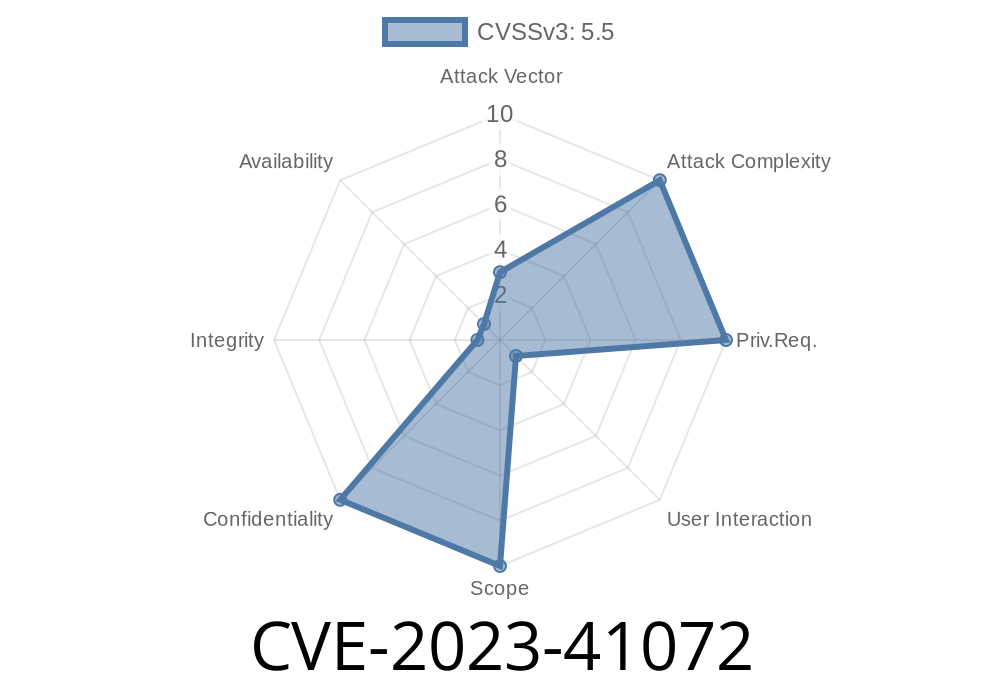In October 2023, Apple quietly fixed a privacy bug under the identifier CVE-2023-41072 in macOS Sonoma 14.1, iOS 17.1, and iPadOS 17.1. This issue centered on how apps could end up leaking users’ sensitive information through unredacted log entries – a classic and dangerous mishandling of privacy-prone data.
Let’s break down what went wrong, how it could have been exploited, and what the actual fix involved. We’ll also cover how developers can avoid similar mistakes, with reference code snippets and real-world context.
What Was CVE-2023-41072?
CVE-2023-41072 flagged a flaw where log statements in Apple platforms could inadvertently include sensitive user data. Imagine an app that, during troubleshooting or analytics, writes debug logs like so:
print("User login: \(userEmail)")
If userEmail is a real email address or identifier, and those logs are aggregated or accessed by other apps/services/processes, your privacy is compromised.
> Apple’s own release notes put it simply:
> _"A privacy issue was addressed with improved private data redaction for log entries. An app may be able to access sensitive user data."_
Links to official sources
- Apple Security Updates – CVE-2023-41072
- Apple’s iOS 17.1 Security Content
- Apple macOS Sonoma 14.1 Security Content
How Could This Have Been Exploited?
Before the fix, any app with access to system or application logs could scan entries for private data: emails, usernames, device identifiers, or even complete authentication tokens.
Example Exploit Scenario
Suppose a malicious or compromised app had read access to system logs (not impossible on some platforms or with some permissions). It could:
Collect and exfiltrate these for phishing, identity theft, or tracking.
// Possible attacker reads over system logs
let logDirectory = "/var/log"
let fileManager = FileManager.default
if let logFiles = try? fileManager.contentsOfDirectory(atPath: logDirectory) {
for file in logFiles {
let filePath = "\(logDirectory)/\(file)"
if let contents = try? String(contentsOfFile: filePath) {
// Search for email-like private data
let matches = contents.matches(for: "[A-Z-9._%+-]+@[A-Z-9.-]+\\.[A-Z]{2,}", options: .regularExpression)
if !matches.isEmpty {
print("Found emails: \(matches)")
// Now emails could be misused or sent to remote server...
}
}
}
}
*Note: Apple sandboxes restrict most log access by default, but a vulnerable logging implementation or privileged process could leak data.*
Apple’s Fix: Redacting Private Data
Starting with macOS Sonoma 14.1, iOS 17.1, and iPadOS 17.1, Apple improved how private data is redacted before anything gets written to logs – both in system and app code. Sensitive values like usernames, emails, tokens, and similar are masked or replaced.
Here’s how privacy-conscious logging should look
func logUserEvent(userEmail: String) {
let redactedEmail = "<REDACTED>"
print("User login: \(redactedEmail)")
}
Or, using Apple’s new logging APIs with privacy indicators
import os.log
let logger = Logger()
let email = "user@apple.com"
logger.log("User login: \(email, privacy: .private)")
This way, if logs are viewed or exported, private data remains hidden.
Avoid Logging Sensitive Data:
Never log raw credentials, tokens, emails, etc., especially if third parties could ever read the logs.
Apple’s new logging APIs help prevent future data leaks.
> For further details, check the Apple security portals:
> HT201222 Apple Security Updates
If you’re a developer: Audit your logs now, and use the latest API protections. If you’re an end user: Update your Apple devices to stay safe!
Timeline
Published on: 10/25/2023 19:15:09 UTC
Last modified on: 11/02/2023 15:05:05 UTC
